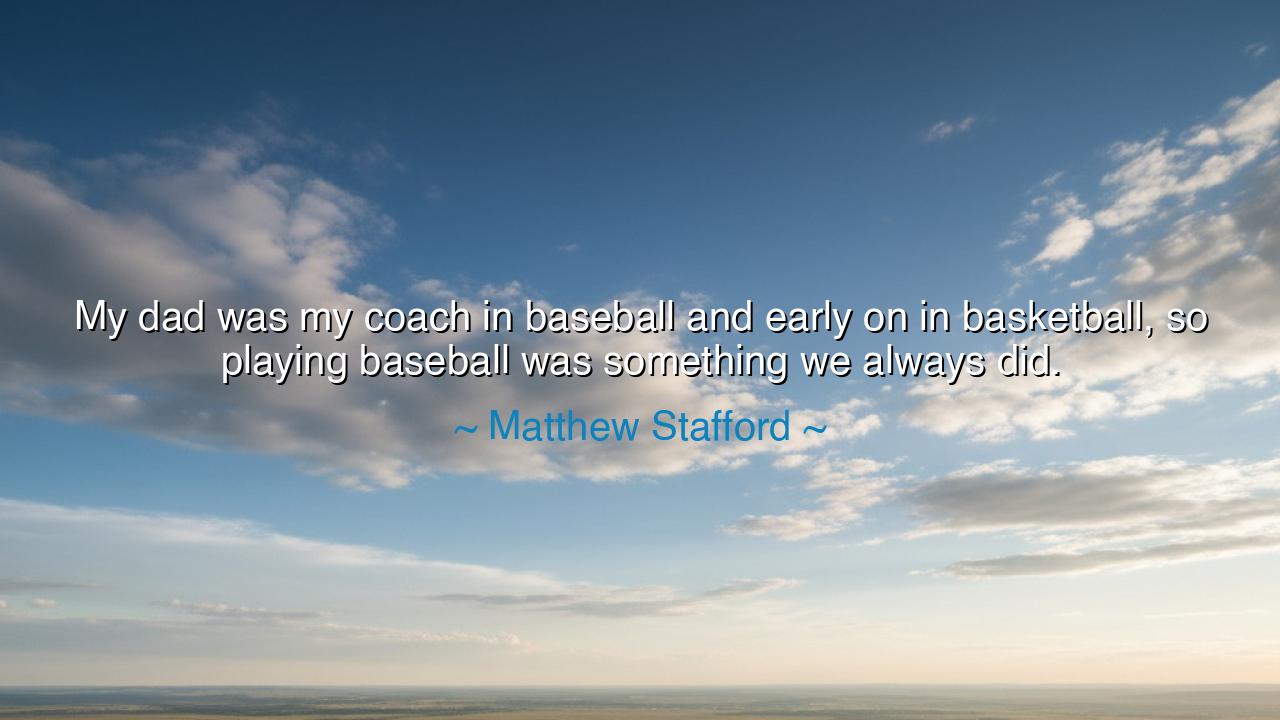
My dad was my coach in baseball and early on in basketball, so
My dad was my coach in baseball and early on in basketball, so playing baseball was something we always did.






When Matthew Stafford said, “My dad was my coach in baseball and early on in basketball, so playing baseball was something we always did,” he spoke of more than a childhood pastime — he spoke of bond, of legacy, and of the sacred rhythm by which wisdom passes from one generation to the next. Beneath these simple words lies an ancient truth: that the most enduring lessons are not taught in grand halls or learned from scholars, but are lived between father and child, between teacher and student, between hearts joined by love and purpose. In every ball thrown, every word of guidance, every shared victory and quiet defeat, there is something eternal — the building of character, of discipline, and of the invisible bridge between family and destiny.
In the age of heroes, fathers were not only providers but mentors. The Greeks told of Achilles and his father, Peleus, who taught him not only how to fight but how to live with honor. “Always excel,” said Peleus, “and be better than the rest.” Those words echoed through Achilles’s life, guiding his courage and shaping his fate. In the same way, Stafford’s memory of his father’s coaching is not simply about sport — it is about the shaping of the spirit. For in the repetition of the game, in the early mornings of practice and the patience of teaching, a father passes down not technique, but values — perseverance, humility, and the sacred joy of giving one’s best.
To play together is to speak a language older than words. When Stafford says, “playing baseball was something we always did,” he reminds us that shared action is the truest form of communication. The ancients knew this well. In Japan’s way of the samurai, the master taught his pupil not through lectures, but through the silent dance of repetition — sword raised, stance corrected, the rhythm of training becoming a bond of souls. So too in the field, the father teaches by example: how to handle defeat with grace, how to respect the opponent, how to rise again after every fall. These are not just lessons in sport, but lessons in life.
In this memory, one can feel the warmth of tradition. Every family, every community, every culture has its own games, crafts, or rituals — the shared activities through which love becomes visible. For Stafford, it was baseball and basketball; for others, it might be farming, fishing, music, or prayer. The outer form may change, but the inner meaning endures: through shared effort, the generations remain connected. In such moments, time itself bends — the father sees his youth reflected in his child’s eyes, and the child glimpses the man he will one day become. This is the ancient cycle of inheritance, not of wealth, but of spirit.
The greatest teachers are those who teach through love. Stafford’s father did not stand apart as a distant authority, but entered the game himself, guiding and learning alongside his son. This is the essence of true mentorship — not command, but companionship. The Roman philosopher Seneca once wrote, “Long is the way by precept, but short and effective by example.” To coach one’s child is to live that truth: to show rather than tell, to embody rather than explain. And in that shared striving — the dust of the field, the laughter after a mistake, the silent pride in improvement — the foundation of a life is laid.
From this quote flows a lesson for every generation: that greatness begins in the ordinary moments we share with those who guide us. A father teaching his son to swing a bat is not just training an athlete; he is cultivating resilience, confidence, and humility. A mentor’s time, given freely and with patience, becomes the soil in which the next generation grows strong. The fields of play, the classrooms of effort, the quiet hours of practice — these are the temples where character is formed.
So, dear listener, remember this: the bond between teacher and learner, parent and child, is sacred. Whatever field you stand upon — be it a court, a stage, or the world itself — carry within you the lessons of those who shaped your early days. Honor them not only in words, but in the way you live: with gratitude, with discipline, with joy in the work of your hands. And when your turn comes to teach, do as Stafford’s father did — coach with love, guide with patience, and let every shared moment become an act of legacy. For in doing so, you ensure that what was once “something we always did” becomes something that will be done for generations to come.






AAdministratorAdministrator
Welcome, honored guests. Please leave a comment, we will respond soon